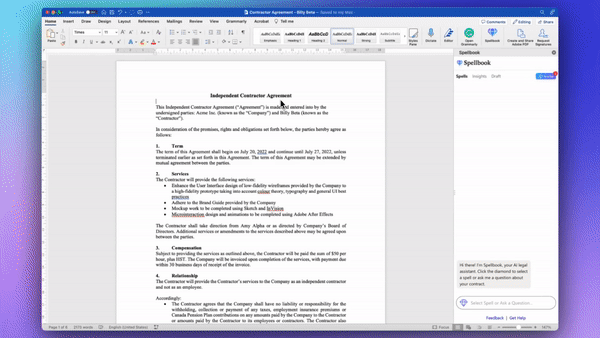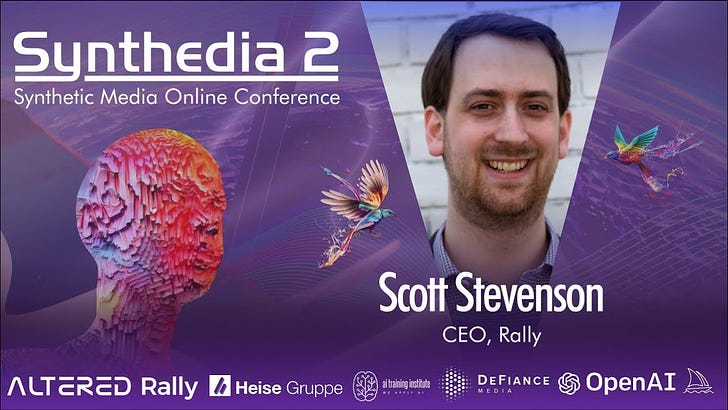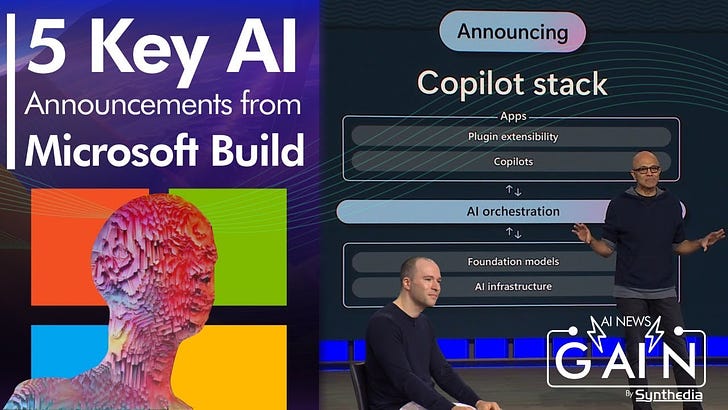Spellbook, the Generative AI Copilot for Lawyers, Raises $10.9 Million
The company also rebranded from Rally Legal to Spellbook
Spellbook has closed a $10.9 million funding round and rebranded from its old name Rally Legal. The brand change was precipitated by the popularity of its generative AI-powered lawyer copilot called Spellbook.
Scott Stevenson, CEO of Spellbook, told Voicebot that Spellbook had a waiting list of 500 law firms in the first week after launching the new product. It appears the demand has only increased. The company says more than 34,000 lawyers have signed up for the early access waitlist, with 8,000 added in April alone.
Overwhelming Demand
Stevenson joined Voicebot’s Eric Schwartz and me for our weekly Generative AI News Rundown live stream earlier today to discuss the news. He said about the fundraising,
“We raised this round because we had overwhelming demand. We weren’t planning to raise anytime soon as a company, but the demand hit a point where we couldn’t keep up without scaling our staff significantly. For example, we had 8,000 lawyers sign up for our service in April. Currently, we are onboarding 50 legal teams a week.
“Our customers find that [Spellbook] can speed up contract reviews by 2x to 4x and that’s a massive improvement for them and for their clients.”
How it Works
Spellbook operates as an add-in for Microsoft Word. It shows up in a side panel when you are using the word processing software. “As you are writing a contract, we will help you draft new language,” said Stevenson.
He added, “If you open up any contract, we are automatically analyzing that contract, figuring out what is aggressive, what is unusual, what might you want to add to make the contract more robust. You can say who you are representing. You can say, ‘I am representing the customer,’ or ‘I’m representing the vendor,’ or the investor, and it will come up with all of these recommendations that the lawyer can use to make that contract better.” The solution also enables you to generate a terms summary, identify items to negotiate, and answer questions about the document.
The easy analogy is that Spellbook is ChatGPT for contract lawyers. Another analogy Stevenson likes is that Spellbook does for lawyers what GitHub Copilot does for developers. In fact, it was GitHub Copilot that sparked the idea for Spellbook.
Stevenson recognized that developers and lawyers both work with language and typically must follow pre-established patterns to be successful. Spellbook trained and fine-tuned an instance of OpenAI’s GPT-3 with “billions of lines” of legal text in a process that sounds similar to the development of Codex, the AI model behind GitHub Copilot. The company now employs a mix of GPT-3.5 and GPT-4 depending on the feature being employed.
Facing Competition
The new funding brings Spellbook’s total investment to $12.4 million. Moxxie led the round with Thomson Reuters Ventures and several other VC firms participating. Thomson Reuters owns legal information resources Westlaw Precision and Practical Law, which could be useful enhancements to Spellbook’s features.
Stevenson confirmed that lawyers primarily work in Microsoft Word. Notably, Thomson Reuters announced this week that Westlaw Precision, Practical Law, and Checkpoint Edge were now available as a plugin for Microsoft 365 Copilot. This includes new features for legal document review and summary and legal drafting. The implication is that these features will now be natively accessible in MS Word.
That could become a challenge for Spellbook at some point. Many law firms already use Thomson Reuters services. If they can get the lawyer copilot features as part of the existing service or for a nominal additional cost, there may be less reason to sign up with Spellbook.
However, for now, Spellbook appears to have a clear lead in the market for business contracts. Stevenson remains focused on helping lawyers with contracts and related business agreements in particular, as opposed to the law in general.
Much of the generative AI fanfare to date has been focused on general-purpose or broad-domain services. The next phase is likely to spotlight the narrow domain solutions like Spellbook that deliver high value for a specific segment of users.
Another AI Writer for Legal Documents Emerges with $5 Million Investment
Techcrunch reported last week that Harvey, an AI-based contract and legal research assistant, emerged from stealth and secured $5 million in funding from the OpenAI Startup Fund. Company co-founder Gabriel Pereyra told Techcrunch that Harvey is designed as a “co-pilot for lawyers.” He added in an email interview:






